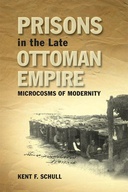Explore
Contrary to the stereotypical images of torture, narcotics and brutal sexual behaviour traditionally associated with Ottoman (or ‘Turkish’) prisons, Kent F. Schull argues that these places were sites of immense reform and contestation during the 19th century. He shows that they were key components for Ottoman nation-state construction and acted as 'microcosms of modernity' for broader imperial transformation. It was within the walls of these prisons that many of the pressing questions of Ottoman modernity were worked out, such as administrative centralisation, the rationalisation of Islamic criminal law and punishment, issues of gender and childhood, prisoner rehabilitation, bureaucratic professionalisation, identity and social engineering. Juxtaposing state-mandated reform with the reality of prison life, the author investigates how these reforms affected the lives of local prison officials and inmates.
This book is included in DOAB.
Why read this book? Have your say.
You must be logged in to comment.
Rights Information
Are you the author or publisher of this work? If so, you can claim it as yours by registering as an Unglue.it rights holder.Downloads
This work has been downloaded 360 times via unglue.it ebook links.
- 119 - pdf (CC BY-NC) at OAPEN Library.
- 151 - pdf (CC BY-NC) at Unglue.it.
Keywords
- Civilisation
- defensive modernisation
- History
- History / Middle East
- Humanities
- Islam
- Islamic life & practice
- Istanbul
- KUnlatched
- Middle East history
- Ottoman Empire
- Ottoman prisons
- penal reform
- Religion & beliefs
- Sharia
- Turkish prisons
Links
DOI: 10.3366/edinburgh/9780748641734.001.0001Editions

